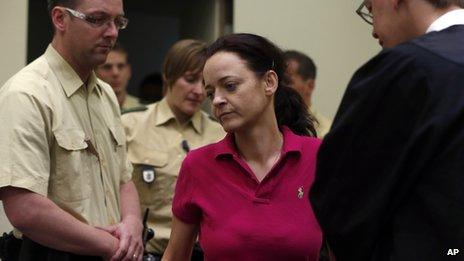German MPs warn of neo-Nazi threat after ethnic Turk deaths
- Published

Beate Zschaepe (centre) is the main defendant in the trial in Munich
German MPs have demanded much tighter surveillance of neo-Nazi activities, after investigating a notorious series of murders targeting ethnic Turks.
MPs said Germany's police and justice officials must exchange intelligence on neo-Nazis, improve training and recruit more ethnic minorities.
Their report condemned "major failures" by security services who had not suspected a violent neo-Nazi cell.
An alleged member of the cell, Beate Zschaepe, went on trial in May.
The cell is accused of 10 murders in Germany, spanning seven years.
The mishandling of the case triggered much criticism, focusing on the failure to explore a racist motive and the initial suspicions about the victims' relatives and friends. It also emerged that the police had used unreliable undercover informers.
The MPs in a cross-party special committee made 47 recommendations, highlighting lessons to be learnt from the blunders.
Alleged racism
The committee chairman, Sebastian Edathy of the Social Democrats (SPD), called the blunders "a historically unprecedented disaster". He handed the 1,000-page report to Norbert Lammert, president of the Bundestag - the lower house of parliament.
"The danger of militant neo-Nazis must never again be underestimated," he said, adding that the threat from such groups had even been "trivialised" sometimes.
"I'm pretty sure that, if a leading police investigator had had a Turkish background, investigating authorities would not have taken six years before seriously considering the possibility that racism was the motive," he said.
Lawyers for the victims said the report did not go far enough - they alleged that "institutional racism" was a factor in the botched investigation into the murders.
Mr Edathy disagreed, saying: "I don't think it is a case of institutional racism, but we do have racists working within the security authorities," Reuters news agency reported.
"Turks murder Turks, that seems to have been the mentality," he said. "Changing this will take longer than changing laws."
Official delays
The case only came to light in November 2011, when Ms Zschaepe handed herself in to police.
Police had found the bodies of two of her alleged accomplices in the National Socialist Underground (NSU). They had apparently shot themselves after a botched bank robbery.
Ms Zschaepe shared a flat in Zwickau, in the old East Germany, with the two men.
After their deaths, the gun used in the murders of the 10 people was discovered.
In their investigation the panel of MPs met 75 times, heard from 107 witnesses and experts, and looked at thousands of files.
But they were hampered by officials who delayed handing over information and in some cases important information was missing, German media say.
A left-wing MP on the panel, Petra Pau, spoke of "files that were missing, shredded or delayed, or incompetent witnesses", the German broadcaster ARD reports.
- Published6 May 2013
- Published6 May 2013
- Published15 November 2011